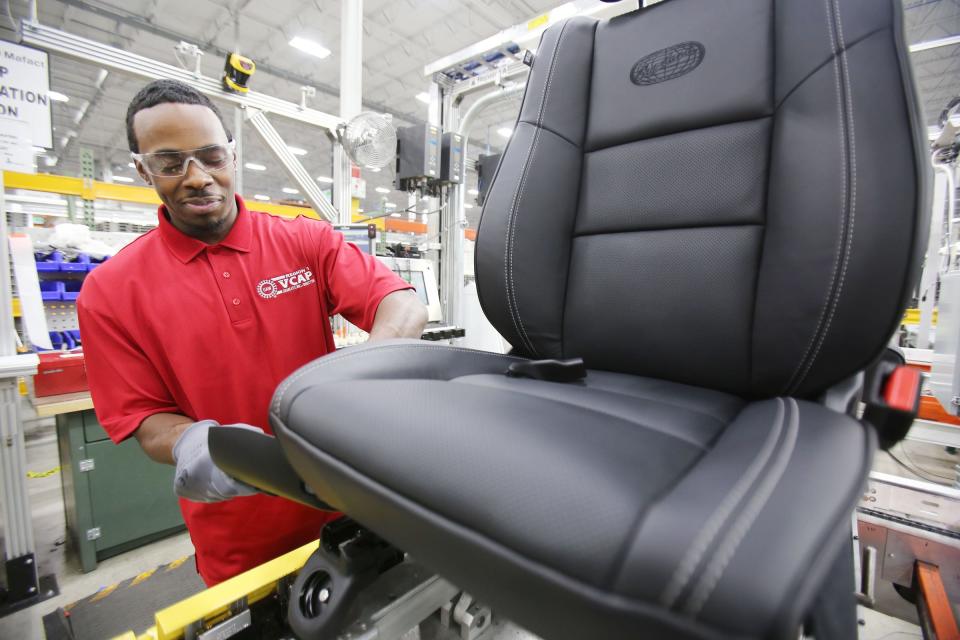Opinion: Michigan corporate subsidies don't help struggling cities
Michigan’s economic development spending encourages job sprawl and widens labor market inequalities within the state’s metro areas. That was the conclusion Good Jobs First — the research and watchdog organization I work for — reached in an extensive study published 17 years ago, and it remains true today.
Corporate subsidies in the name of economic development continue to advantage prosperous suburbs over disinvested, racially segregated urban areas. And while the use of subsidies is defended as necessary for Michigan to compete with other states for new investment, more often these “incentives” simply reward companies with windfalls for projects that would have happened even without public support.
Consider a pair of grants recently awarded to global auto parts giant Magna International for expansion projects in metro Detroit.
This past October, the Michigan Strategic Fund awarded Magna a $2.9 million business development grant to expand its seating assembly operation in Highland Park.

The grant will fund most of Magna’s proposed $3.8 million expansion there, and in exchange, the company has committed to creating between 350 and 490 new jobs.
These employees are expected to earn an average of $700 a week.
During the same meeting, the strategic fund also awarded Magna’s powertrain division $1.7 million in grants and tax abatements to support the construction of a $96 million factory in Shelby Twp. in northern Macomb County, where it will produce battery trays for electric vehicles.
Though that site will only employ 159 workers, they are expected to make $2,500 a week — more than triple what the jobs in Highland Park will pay. Because Shelby Twp. does not have a municipal income tax, workers there will also pocket an extra 1% to 2% of their earnings.
Median annual earnings among Highland Park’s predominantly Black workforce are $36,000 a year, and the unemployment rate is over 20%. In Shelby Twp., where workers are almost entirely white, median earnings are $63,000. Only 3.9% are unemployed.

While the high-wage positions in Shelby Twp. are certainly open to workers in Highland Park, lack of formal education will likely stop many at the plant gate. Three-quarters of adults in Highland Park do not have any form of postsecondary credential.
Even those Highland Park residents who might be competitive job seekers face a punishing hour-and-a-half commute by bus, one way — more than a third of Highland Park households do not own cars.
The wage disparity between projects is so great that even though at least 300 more workers will be assembling seats in Highland Park, total payroll at Magna’s new Macomb County plant will be larger.
Workers currently assembling seats in Highland Park who hope to someday earn more by switching to battery trays will likewise be disappointed.
In its grant application, Magna says of the Shelby Twp. project that, “each business entity under a division manufactures products that require a completely different skillset… Since the skills required are very technical and unique it is very unlikely there will be many employees transferred from an existing Michigan business operation to the facility.”
Magna included this language to argue that the jobs it creates in Shelby Twp. should be considered separate from the 10,000 workers it already employs in Michigan. The upshot, as the application states, is that “Magna would be able to eliminate any or all of its jobs within the state and the Company would still qualify for 100 percent of the grant.”
(Good Jobs First believes subsidy deals should include statewide job retention commitments.)
The company’s application likewise gives no indication that Magna considered other sites in the metro area before opting to build its high-wage EV battery tray facility in the newly opened Shelby Commerce Center, which now has five confirmed tenants.
Meanwhile, the Means Logistics Park in Highland Park has yet to secure a single tenant, despite offering comparably sized sites and similar features. In the summer of 2021, the Michigan Strategic Fund approved $5.7 million in state tax refunds and $8.9 million in local tax refunds from Highland Park and Wayne County to reimburse the park’s developer, Ashley Capital.
When asked for details on the site selection process, a spokesperson for the Michigan Economic Development Corp. said that “Magna has its own real estate team,” and he “wouldn’t be able to speak to the sites they evaluated before ultimately choosing Shelby Township.”
He did add that the Michigan Strategic Fund has partnered with the Means Logistics Park, “to ensure that industrial space is available for projects similar to” Magna's facility in Shelby Twp.
Had both divisions decided to expand in Highland Park, the city would have enjoyed at least another $2 million in income tax revenue, regardless of who ended up working in the plants.
That’s revenue the city desperately needs. Last year, Highland Park enacted deep budget cuts, almost halving spending on services to avoid running another annual deficit.
Renewed concern about the city’s $24.5 million debt to the Great Lakes Water Authority is only the latest turn in a decades-long vicious cycle of declining revenues and spiraling debts, piling up on a city of highly segregated poor and working-class Black residents.
How do we expect distressed cities like Highland Park to get out of this fiscal doom loop when jobs there pay such low wages, and the most valuable industrial property within their borders is shielded by property tax abatements or part of special tax districts that divert revenue back to developers?
According to Michigan's economic development operation, we should blame Tennessee. In its application, Magna argued that the Highland Park grant was “necessary to make the expansion in Michigan a competitive decision,” citing various subsidy programs in Tennessee, where the company also manufactures seats.
The board unanimously obliged, and in an accompanying press release, the MEDC noted that “Michigan was chosen for the project over competing sites.”
Last month, the Tennessee Department of Economic and Community Development announced that Magna would also build a seat assembly facility there, at Ford’s BlueOval City supplier park, bringing 300 new jobs to the state.
In other words, Michigan didn't win out over Tennessee. Magna simply collected subsidies in two states.
If Michigan was prepared to part with $2.9 million, surely there were better ways to serve the residents of Highland Park. That money could have been spent to offset local service cuts, improve transit connectivity across the metro area, or train workers in the city to compete for higher-paying jobs.
The best use for the money might have been to simply cut every family in Highland Park living in poverty a $5,200 check.
These alternatives, though, are off the table, under a trickle-down economic development model that measures success in terms of higher profits, rather than higher wages or higher quality public services.
Michiganders must refuse to continue playing the useful dupes. It’s high time we demand that public money be used for the general welfare, not corporate welfare.
Jacob Whiton is a researcher with Good Jobs First, a watchdog and policy resource center promoting corporate and government accountability in economic development. He lives in Detroit. Contact the Free Press opinion page : letters@freepress.com.
This article originally appeared on Detroit Free Press: Opinion: Michigan corporate subsidies widen economic, racial disparity

